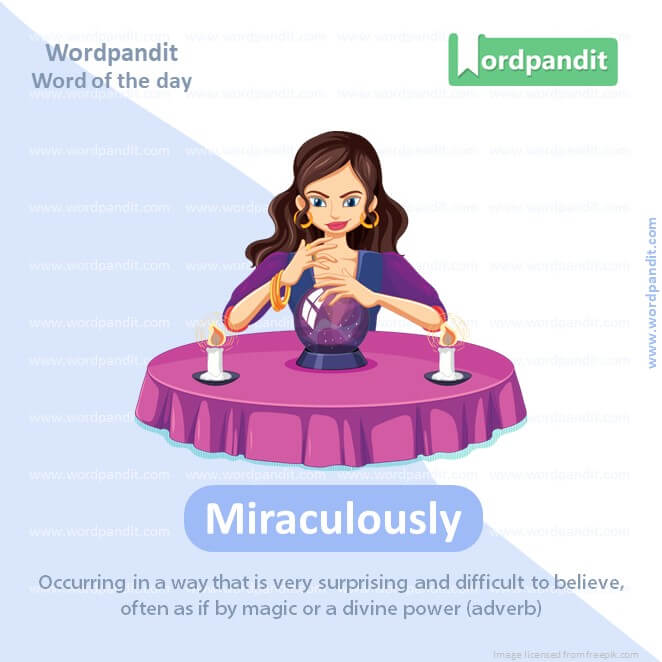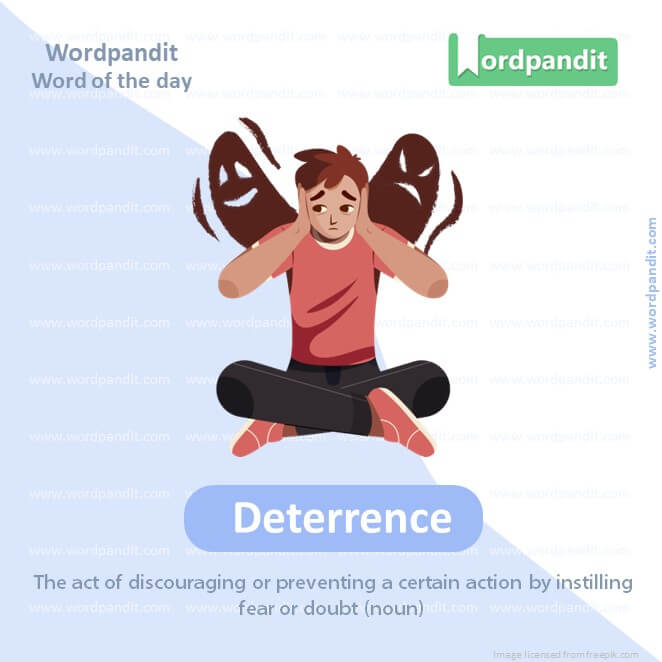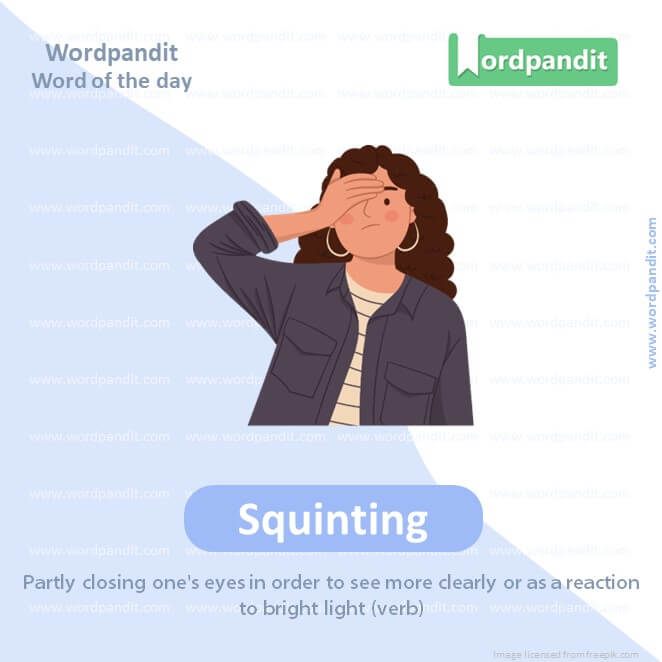Daily Vocabulary Words: List of Daily Used Words in Leading International Newspapers
Hi there. Welcome to this special section @ Wordpandit.
Our endeavour here is very simple: to highlight important daily vocabulary words, which you would come across in leading newspapers in the country. We have included the following newspapers in our selection:
• The New York Times
• The Washington Post
• Scientific American
• BBC
• The Guardian
• Psychology Today
• Wall Street Journal
• The Economist
We are putting in extensive work for developing your vocabulary. All you have got to do is be regular with this section and check out this post on a daily basis. This is your repository of words that are commonly used and essentially, we are posting a list of daily used words. Hence, this has significant practical application as it teaches you words that are used commonly in leading publications mentioned above.
Visit the website daily to learn words from leading international newspapers.

WORD-1: Miraculously
CONTEXT: We miraculously survived an airstrike and found them fainted in the morning. Please pray for us.
SOURCE: New York Times
EXPLANATORY PARAGRAPH: Imagine you wished really hard for something almost impossible, like a tiny seed turning into a big flower overnight, and then it actually happens! That’s what “miraculously” means. It’s like magic when something amazing and very surprising happens, especially when it seemed like it couldn’t.
MEANING: Occurring in a way that is very surprising and difficult to believe, often as if by magic or a divine power (adverb)
PRONUNCIATION: muh-RAK-yuh-lus-lee
SYNONYMS: astonishingly, amazingly, wonderfully, extraordinarily, incredibly
USAGE EXAMPLES:
1. Miraculously, the lost cat found its way home after a month.
2. The plant miraculously survived the harsh winter.
3. He miraculously recovered from his illness against all odds.
4. The team won the game miraculously in the last second.

WORD-2: Deteriorating
CONTEXT: My injured son’s health is deteriorating because of the famine.
SOURCE: New York Times
EXPLANATORY PARAGRAPH: Imagine your favorite toy starts to break or doesn’t look as bright and shiny as it used to because you’ve played with it so much. That’s what “deteriorating” means. It’s when something gets worse over time, like when it gets old or broken.
MEANING: Becoming progressively worse (verb).
PRONUNCIATION: dih-TEER-ee-uh-ray-ting
SYNONYMS: worsening, declining, degenerating, decaying, degrading
USAGE EXAMPLES:
1. The weather is deteriorating, so we might have to cancel our picnic.
2. His health began deteriorating after the accident.
3. The old house is deteriorating because no one has lived in it for years.
4. The situation deteriorated quickly, leading to a crisis.
WORD-3: Grinding
CONTEXT: We have started grinding it, bake it and eat it.
SOURCE: New York Times
EXPLANATORY PARAGRAPH: Imagine using a pencil sharpener to make your pencil sharp again by turning it around and around. The sharpener scrapes the pencil to make it sharp; that’s a bit like “grinding.” Grinding is when you rub or crush something hard together, often to make it smaller or smoother.
MEANING: The act of breaking something down by rubbing or crushing (verb).
PRONUNCIATION: GRYN-ding
SYNONYMS: crushing, pulverizing, milling, shredding, smashing
USAGE EXAMPLES:
1. She was grinding coffee beans to make fresh coffee.
2. The old mill is used for grinding wheat into flour.
3. The sound of teeth grinding can be very annoying.
4. He spends hours grinding spices by hand for his recipes.

WORD-4: Deterrence
CONTEXT: There is actually a stable balance of deterrence there right now.
SOURCE: New York Times
EXPLANATORY PARAGRAPH: Think of when you’re about to do something naughty, like eating a cookie before dinner, but your mom gives you a look that makes you decide not to. That look is like “deterrence.” It’s something that stops you from doing something because you know it might not end well.
MEANING: The act of discouraging or preventing a certain action by instilling fear or doubt (noun)
PRONUNCIATION: dih-TUR-uhns
SYNONYMS: prevention, discouragement, inhibition, dissuasion, restraint
USAGE EXAMPLES:
1. The strict rules serve as a deterrence for breaking the law.
2. The presence of security cameras is a deterrence to theft.
3. The threat of punishment acts as a deterrence against cheating.
4. Deterrence is important in maintaining discipline in schools.

WORD-5: Arrayed
CONTEXT: The young U.S. soldiers and sailors arrayed against them cut their teeth on video games.
SOURCE: New York Times
EXPLANATORY PARAGRAPH: Imagine setting up your toys in a line or making a pattern with them on the floor. That’s what “arrayed” means. It’s when things are placed in an order or a particular way, often to look nice or to be organized.
MEANING: Placed or arranged in an orderly, often attractive, formation (verb)
PRONUNCIATION: uh-RAYD
SYNONYMS: arranged, ordered, organized, aligned, deployed
USAGE EXAMPLES:
1. The soldiers were arrayed in formation for the parade.
2. The table was arrayed with all sorts of delicious foods.
3. She arrayed the flowers in a beautiful pattern.
4. The books were arrayed neatly on the shelf.
WORD-6: Arsenals
CONTEXT: they were never meant to deter or attack the vast modern rocket arsenals of Iran and its proxies.
SOURCE: New York Times
EXPLANATORY PARAGRAPH: Imagine a superhero’s toolshed where they keep all their special gadgets and equipment to save the day. That’s like an “arsenal.” It’s a place or collection where lots of tools, weapons, or other important things are kept so they can be used when needed.
MEANING: Collections of weapons and military equipment (noun).
PRONUNCIATION: AHR-suh-nuhlz
SYNONYMS: armories, caches, depots, stockpiles, stores
USAGE EXAMPLES:
1. The country has a large arsenal for its defense.
2. He has an arsenal of tools in his garage for every type of repair.
3. The police seized an illegal arsenal in the raid.
4. The team has an arsenal of strategies to win the game.
WORD-7: Unscathed
CONTEXT: the drone struck; protected by a thick cement barrier, he emerged shaken but unscathed.
SOURCE: New York Times
EXPLANATORY PARAGRAPH: Imagine riding your bike, falling off, and then getting up to find you don’t have a single scratch or bruise. That’s what “unscathed” means. It’s when you go through something that could have hurt you, but you come out perfectly fine without any harm.
MEANING: Without suffering any injury, damage, or harm (adjective).
PRONUNCIATION: un-SKAYTHD
SYNONYMS: unharmed, uninjured, unhurt, intact, safe
USAGE EXAMPLES:
1. Despite the accident, she emerged unscathed.
2. The house remained unscathed after the storm.
3. He hoped to get through the debate unscathed.
4. The phone fell but was unscathed due to the protective case.

WORD-8: Squinting
CONTEXT: line of defense is usually a 20-something U.S. soldier or sailor squinting at a computer screen, trying to decide with software within seconds what is coming his or her way and engaging the right countermeasures.
SOURCE: New York Times
EXPLANATORY PARAGRAPH: Imagine trying to look at something really bright, like the sun, and you almost close your eyes to see better. That’s “squinting.” It’s when you partly close your eyes to see something more clearly or to block out bright light.
MEANING: Partly closing one’s eyes in order to see more clearly or as a reaction to bright light (verb)
PRONUNCIATION: SKWIN-ting
SYNONYMS: peering, blinking, gazing, looking, glaring
USAGE EXAMPLES:
1. She was squinting in the bright sunlight.
2. He squinted to read the small print on the label.
3. Squinting, she tried to recognize the person in the distance.
4. The bright lights made him squint as he entered the room.
WORD-9: Ingrained
CONTEXT: we swear an oath to an idea, embodied in the Constitution and ingrained in our democracy, that all men and women are created equal.
SOURCE: New York Times
EXPLANATORY PARAGRAPH: Imagine if you spill some juice on your favorite white shirt, and even after washing it, you can still see a faint stain. That stain is “ingrained,” meaning it’s really hard to get out. In the same way, something ingrained is a habit or idea that’s become a big part of you and is hard to change.
MEANING: Deeply embedded or firmly fixed, often referring to habits, beliefs, or ideas (adjective)
PRONUNCIATION: in-GRAYND
SYNONYMS: embedded, entrenched, deep-rooted, fixed, instilled
USAGE EXAMPLES:
1. Respect for others is an ingrained principle in our community.
2. The habit of reading before bed is ingrained in her routine.
3. Such beliefs are deeply ingrained in the culture.
4. The stains on the carpet are too ingrained to be cleaned.
WORD-10: Allegiance
CONTEXT: the oath of allegiance to an idea, not a king, muffled by the protective blast walls of this far-flung base in a region that has mostly known only the opposite.
SOURCE: New York Times
EXPLANATORY PARAGRAPH: Imagine you’re part of a team, and you promise to always stick with them, support them, and follow the team rules. That promise and support you give your team is like “allegiance.” It means being loyal and committed to a group, like a team, a country, or a cause.
MEANING: Loyalty or commitment to a person, group, or cause
PRONUNCIATION: uh-LEE-juhns
SYNONYMS: loyalty, fidelity, devotion, faithfulness, adherence
USAGE EXAMPLES:
1. The knights swore allegiance to their king.
2. She has shown her allegiance to the cause through her actions.
3. Changing teams was seen as a betrayal of allegiance.
4. Allegiance to their country is very important to them.
Vocabulary
Language is a confluence of thoughts, emotions, and experiences that find vibrant expression through words. In this spectrum, ‘vocabulary’ shines as a critical aspect that shapes and directs our language proficiency. It offers depth, nuance, and clarity to our expressions. However, mastering ‘vocabulary’ is an art that requires a strategized approach.
An intensive strategy for learning ‘vocabulary’ goes beyond the limiting precincts of memorization. Instead, it nudges learners towards comprehension and application. To understand ‘vocabulary’, take a step forward from traditional textbooks and classroom sessions, and embrace the vast world of books, articles, podcasts or digital content in the language you are learning. This step allows you to understand words in context, see how they are used in different situations, and absorb words as part of the natural flow of language.
As you journey through ‘vocabulary’, remember that this expedition should not be a race. Rather, it’s a marathon where pacing yourself is pivotal to long-term success. Learning a few words each day and consolidating your knowledge through regular revision tends to be more effective, as it prevents cognitive overload and promotes solid retention.
Interactive learning tools can provide valuable support in assimilating ‘vocabulary’. Use of flashcards, language-learning apps, or memory-enhancing software can make this process more engaging and effective, reinforcing the ‘vocabulary’ in your memory.
Lastly, practice is an incontrovertible part of mastering ‘vocabulary’. Utilize the learnt vocabulary in your daily conversations, write-ups, or presentations to ensure an active application. Doing this fosters recall and cements understanding.
In summation, learning ‘vocabulary’ is a journey that should be embraced with an integrated approach, where understanding and application are the key elements. By engaging with diverse learning resources, pacing the learning process, employing interactive learning tools, and practicing regularly, the journey of mastering ‘vocabulary’ becomes a fulfilling and enriching experience.













